-
 18 min. read
18 min. read
-
 Trevin Shirey
Trevin Shirey VP of Marketing
VP of Marketing
- Trevin serves as the VP of Marketing at WebFX. He has worked on over 450 marketing campaigns and has been building websites for over 25 years. His work has been featured by Search Engine Land, USA Today, Fast Company and Inc.
Google is the most popular search engine in the world. Its search results are determined by Google’s top-secret algorithm, which is protected as a trade secret, and it completes more than 1 trillion searches every year. Google has one of the largest caches of user data in the world, potentially surpassing government agencies like the NSA, CIA, and FBI.
But unlike those government agencies, most people trust Google with their information — as long as they get a service in return. Most users also trust that Google’s search results are unbiased and entirely based on a machine algorithm that consistently produces the same kinds of results every time it’s used. So at the end of the day, Google has the world’s most popular search engine, dozens of services that people use without a second thought, and the trust that they’re treating all of their indexed websites equally.
Even with Google’s slogan of “Don’t be evil,” all of this begs one important and disturbing question. What’s stopping Google from manipulating search results for the company’s benefit? The answer — as we’ll find out in a series of experiments — is equally disturbing.
Nothing.
Dr. Robert Epstein & Ronald E. Robertson: The Google Experiments
Dr.
Robert Epstein & Ronald E. Robertson tested several thousand participants in a series of experiments to see if online search results influenced opinion. The results not only proved that Google influences public opinion — but also showed how Google does it.
Epstein & Robertson coined this phenomenon the Search Engine Manipulation Effect (SEME). 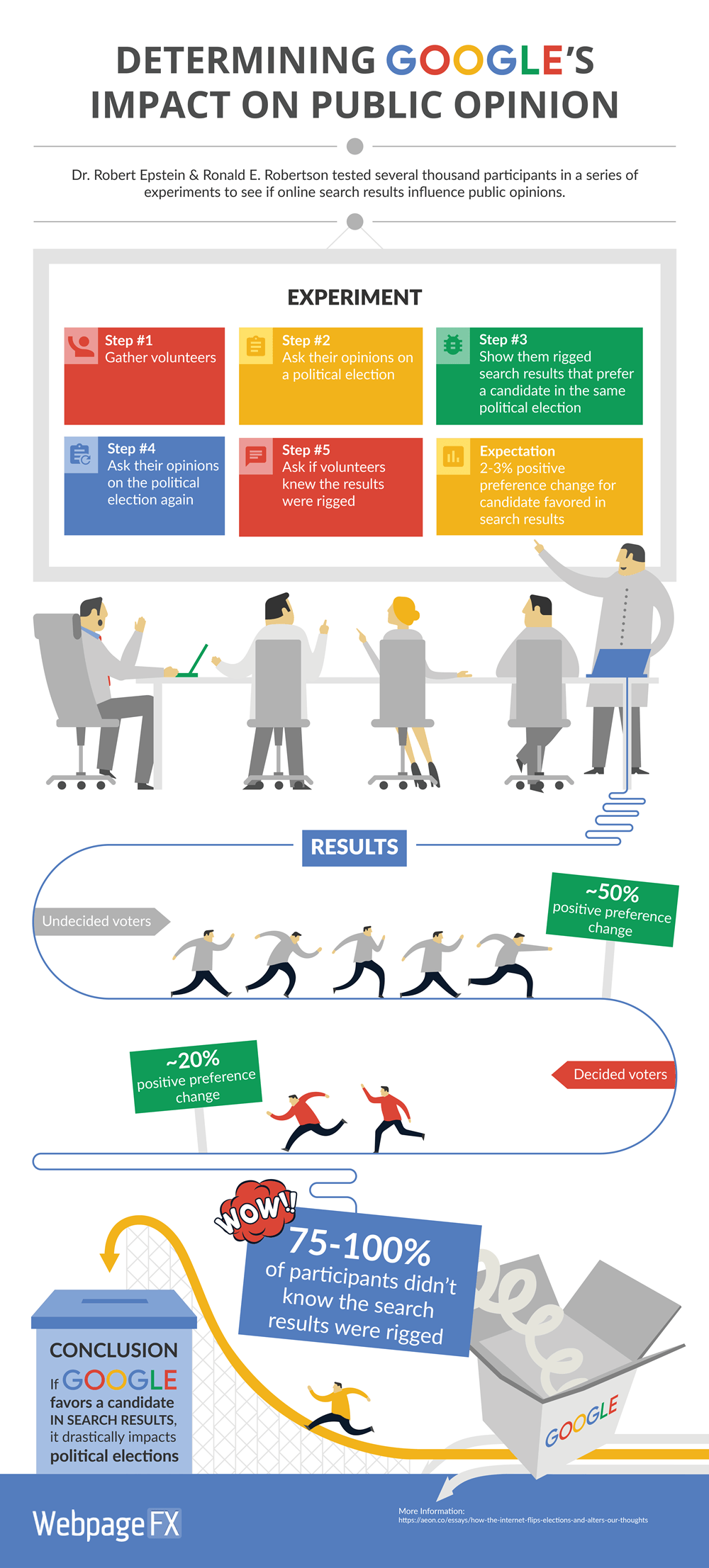 In the initial experiment, Epstein & Robertson showed that search results influenced their test subjects’ opinions, and they replicated those results multiple times with different groups. Each case showed that subjects’ political opinions changed — sometimes drastically — depending on which candidate was favored in search results about an upcoming election.
In the initial experiment, Epstein & Robertson showed that search results influenced their test subjects’ opinions, and they replicated those results multiple times with different groups. Each case showed that subjects’ political opinions changed — sometimes drastically — depending on which candidate was favored in search results about an upcoming election.
Epstein & Robertson predicted that’d happen, though. They predicted that subject opinions would change by about 2-3% for the candidate that was shown favorably in search results. The results were anything but predictable.
Undecided or neutral voters who saw favorable results for a candidate rated their preference for that candidate about 50% higher after viewing search results. One way that Epstein & Robertson tested undecided voters was to ask people of different nationalities about foreign elections, ensuring there would be as little bias as possible in search results. One example of this was asking Americans about Australian elections.
Even more surprising, decided voters rated their preference for a favored candidate about 20% higher after viewing search results. To rate the preference of decided voters, Epstein & Robertson asked subjects about their preferences in elections where they would probably already have an opinion. But even the drastic change in voter preference takes a back seat to the experiment’s most significant discovery.
Between 75-100% of participants didn’t know they were looking at rigged search results. Epstein & Robertson carefully planned the pages of search results they showed to participants by using a mock search engine. And even with a mock search engine, almost no one realized that someone doctored the search results.
That has some dire implications for search engines as a whole. And since Google is the most widely-used search engine in the world (by far), that means Google is incredibly powerful in terms of information control. So powerful, in fact, that Google can potentially impact every decision we make in a day — as long as we use Google in the first place.
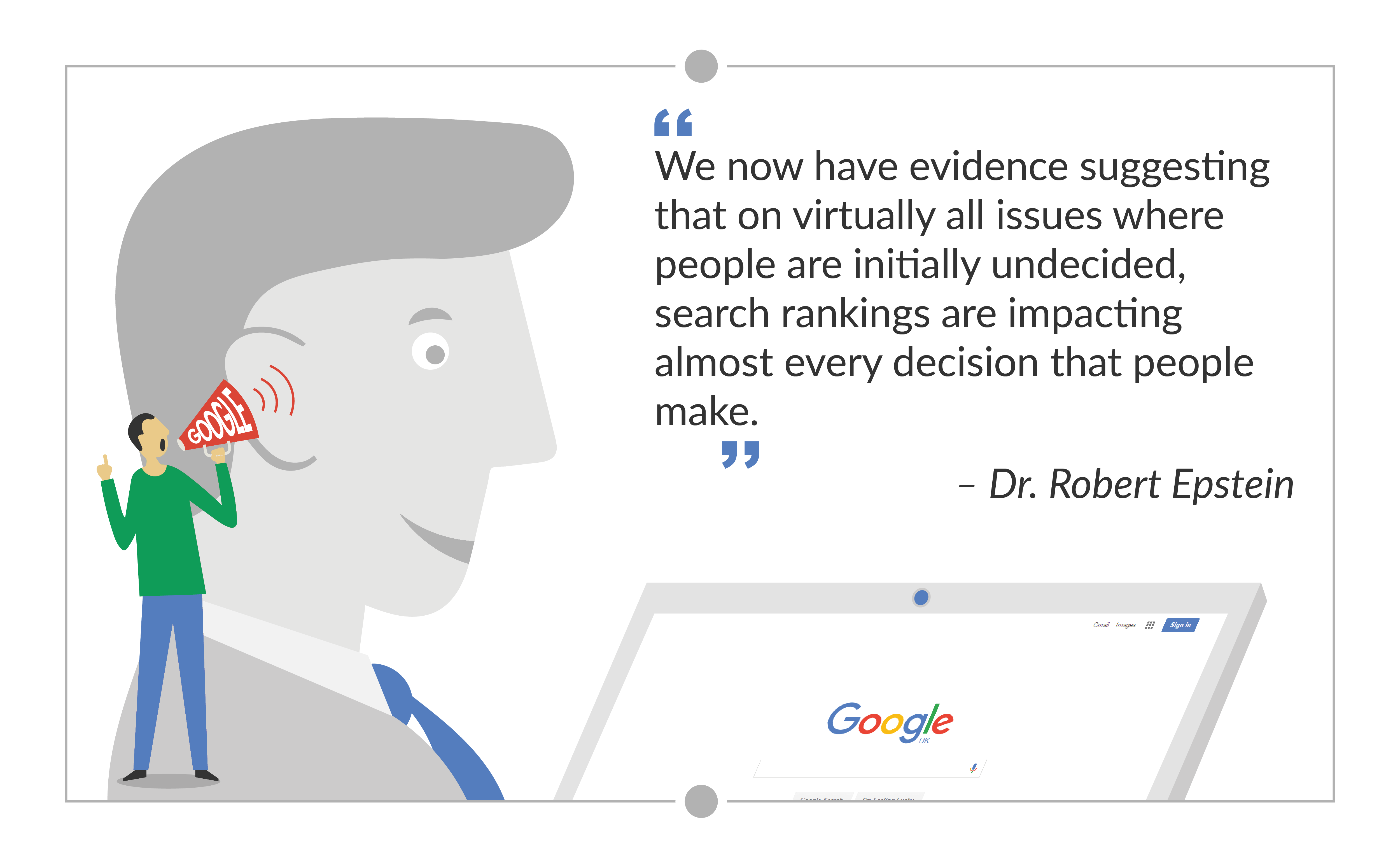 But there’s an easy solution to this, right? Just don’t use Google. Simple.
But there’s an easy solution to this, right? Just don’t use Google. Simple.
Concise. It’s a great answer. And if you can do that, more power to you.
But according to our data, there’s a really, really good chance that you can’t.
Looking for an all-in-one SEO audit tool? You’ve found it.
SEO Checker provides data on key metrics to give you:
- Complete SEO score
- Content Grade
- Site Speed Analysis
- and more.

Google’s search market share
As we established earlier, Google is the most-used search engine in the world. At the time we gathered the data for this series of graphics (April 2016), Google maintained a hefty share of the search market.
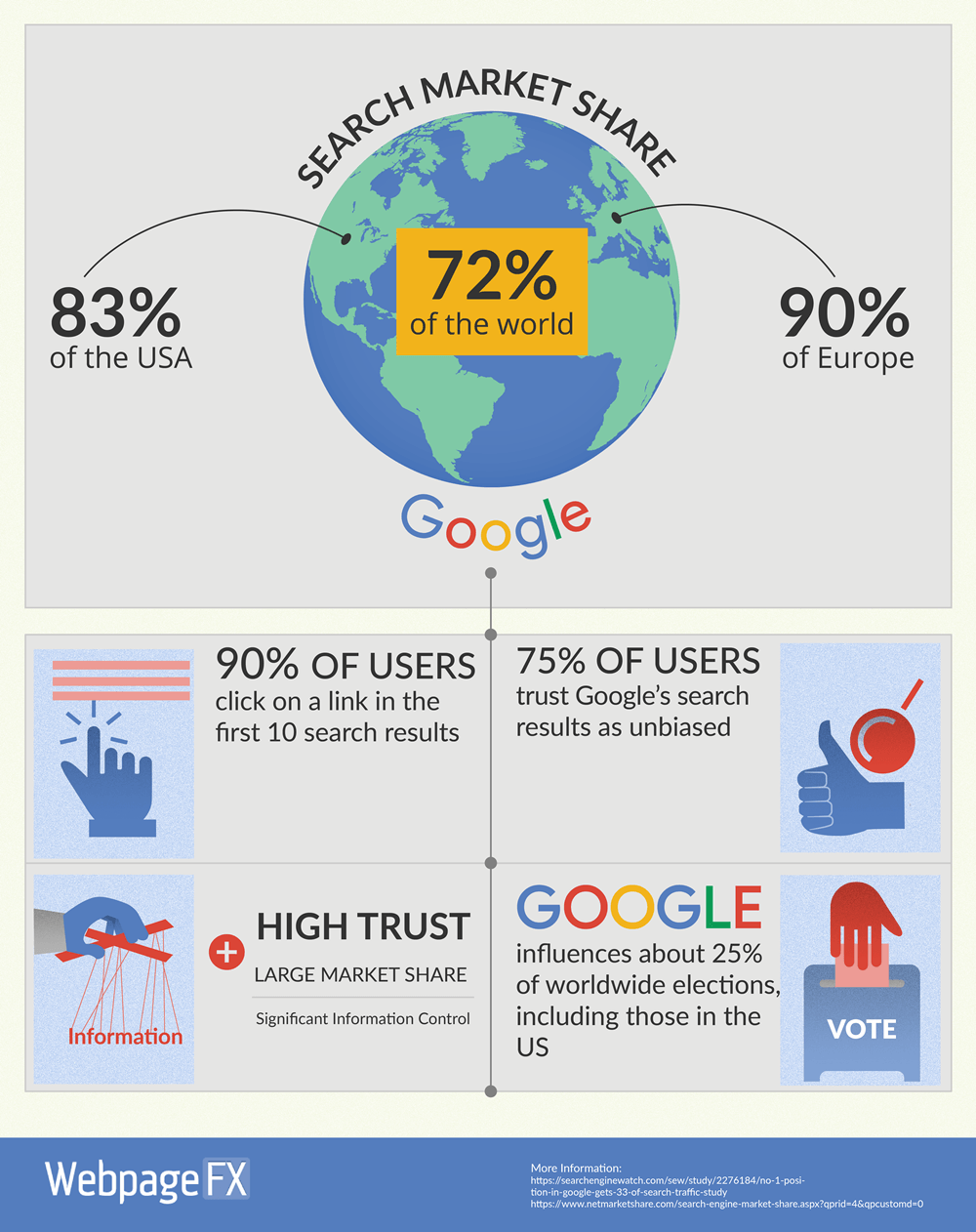 Granted, that may have fluctuated depending when you’re reading this. But generally, Google hovers consistently between 66-75% of the world’s search market share. On any given day, that means every 2/3 or 3/4 people who use search engines go through Google for information.
Granted, that may have fluctuated depending when you’re reading this. But generally, Google hovers consistently between 66-75% of the world’s search market share. On any given day, that means every 2/3 or 3/4 people who use search engines go through Google for information.
And in the US and Europe, it’s far more than that. Plus, 90% of Google users click a link on the first page of search results whenever they make a query. That means a huge share of users don’t even look at the second page, and even fewer look at the third, fourth, and so on.
On top of that, about 75% of all Google users trust that Google’s search results are unbiased. After all, they come from an algorithm — and how could a computer program have an opinion? That combination of high trust and a sizable market share gives Google significant control over the information that it shows.
In fact, Google already influences about 25% of elections throughout the world — including those in the United States. That means any country with Internet access is subject to the opinion-swaying potential of Google. But hold on — this is all a pretty hefty accusation, right?
If Google really did control information in the way that we’re proposing, they probably would have been caught already. After all, if someone has the resources to do something, that doesn’t mean they’ll actually do it. But in Google’s case, they’ve already done it.
And probably a lot more than we realize.
Google’s history of search manipulation
Google has been caught manipulating search results multiple times and in multiple countries. They’ve paid dearly — more money than most countries see in a year — but it’s safe to assume that they’ve earned much more. After all, there’s no telling how long Google has manipulated its search results or how else they may be doing it.
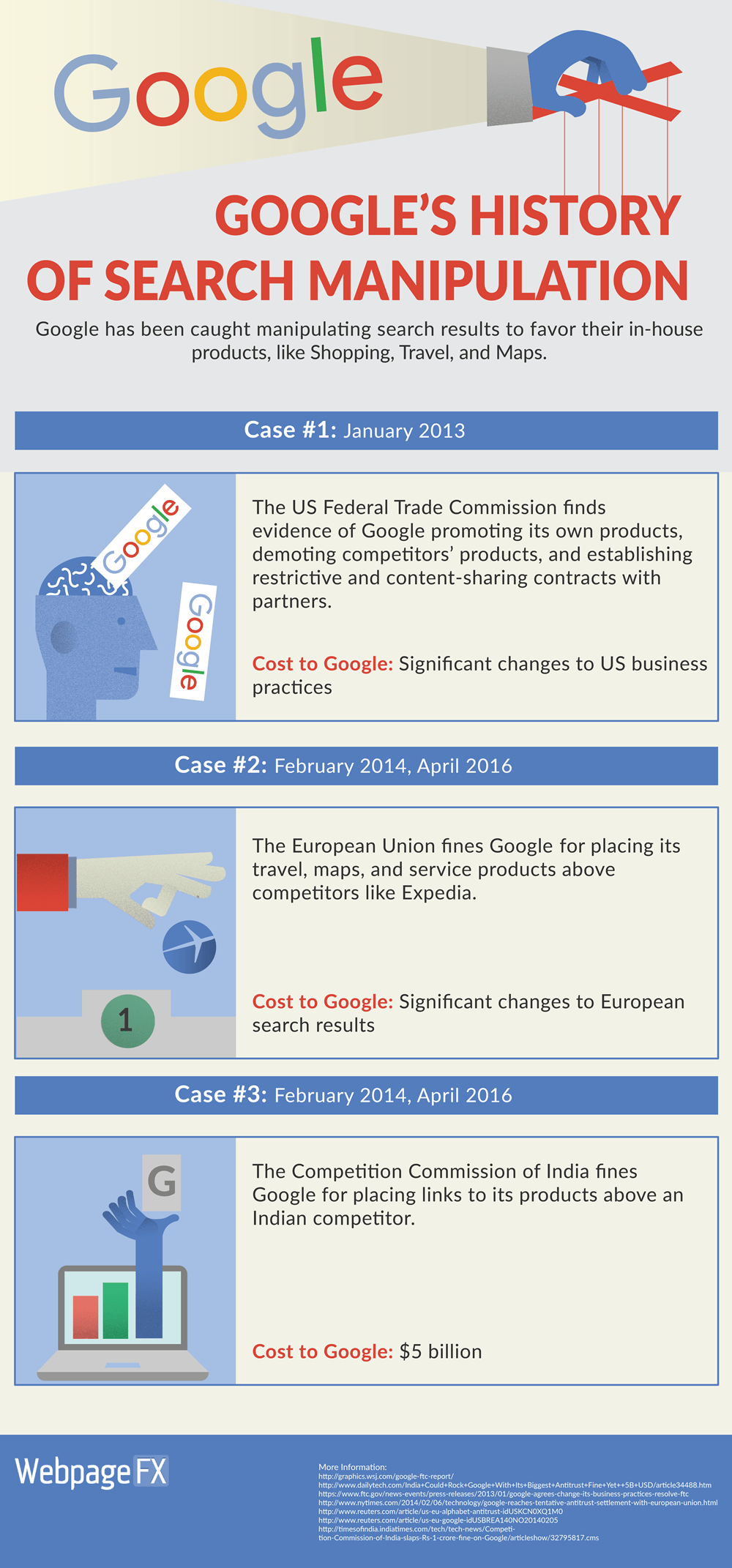 In general, Google makes a change to its algorithm 1-2 times per day, at least according to their most famous senate testimony. Very few of those changes are actually publicized. Some of them have a big impact on search results, and others may have little to no impact at all.
In general, Google makes a change to its algorithm 1-2 times per day, at least according to their most famous senate testimony. Very few of those changes are actually publicized. Some of them have a big impact on search results, and others may have little to no impact at all.
And sometimes, these changes are reversed like they never happened. In other words, even with awesome tools like Mozcast, there’s no way to tell what changes have happened to Google’s algorithm or how much those changes impact search results. Plus, Google fields billions of queries every day — 16% of which have never been asked before.
Intentionally modifying the search results for a handful of keywords would be incredibly easy and largely go unnoticed. And even if someone did notice the change, Google could frame it as an attempt to improve search results. So yes, Google has been caught modifying search results to promote its own products.
Clearly, the company is set on horizontal integration and gradually cleaning out their competitors to create a solid hold on virtually any service someone could want from the Internet. But that much has been clear for a long time — since the launch of Gmail, actually. Google has no intention of slowing down its growth, and they’re constantly on the lookout for new revenue streams.
Which brings us to our next point.
Google’s massive data cache
Google collects tons of data on its users, including discontinued products. It stores a borderline-astronomical amount of information on anyone that so much as even looks at a Google logo. Unless you’ve taken precautions to throw Google off your scent, Google knows where you live, what you eat, when you sleep, how you talk, what you like, what sites you visit, and so much more.
(All things considered, Google could probably psychoanalyze you with as much accuracy as an actual psychiatrist. Considering people already use Google as a doctor, that’s not too much of a stretch, either.) 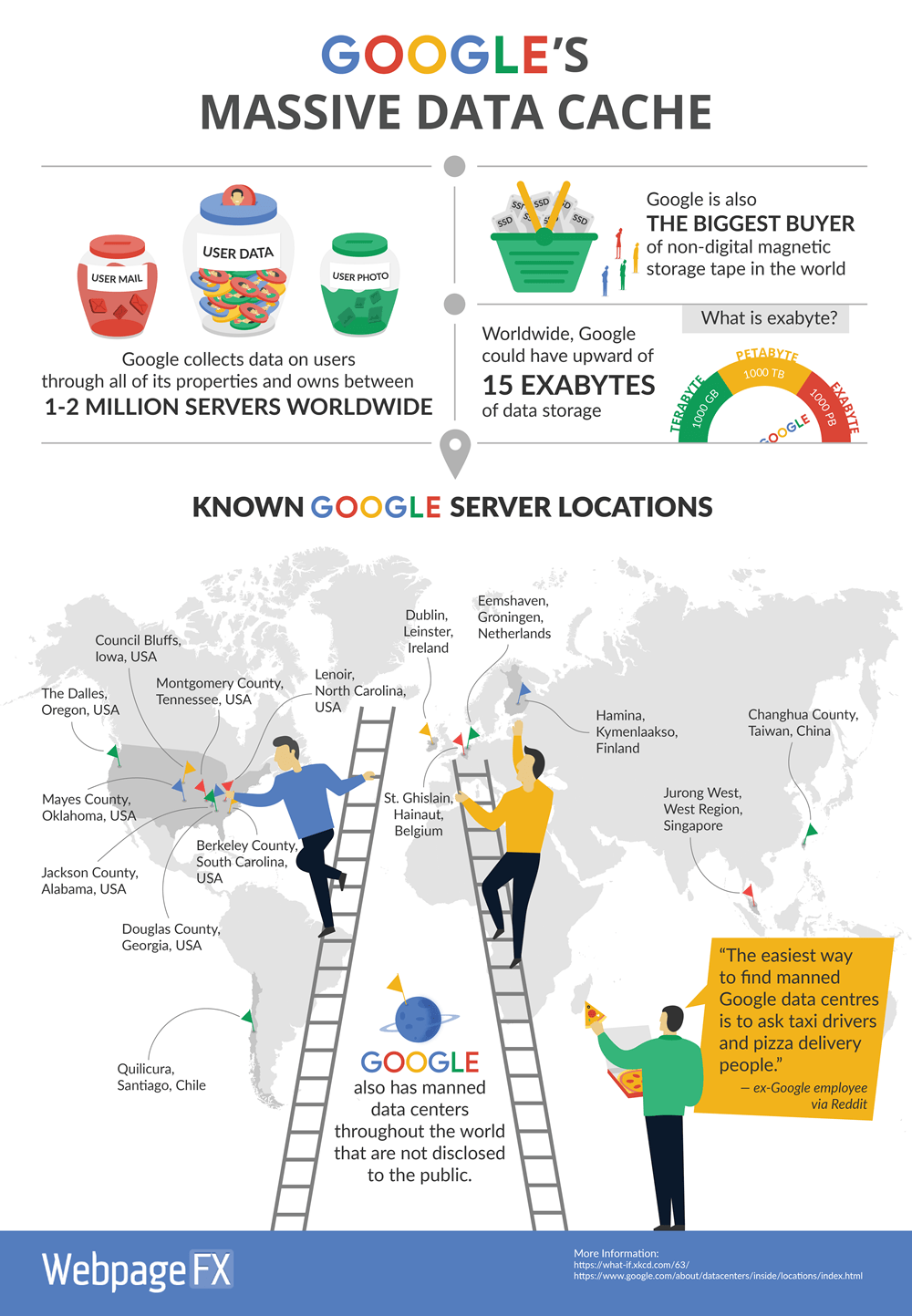 Altogether, Google could have up to 15 exabytes of storage, according to one of the most logical estimates by Randall Munroe. With all of that storage capacity, who does Google actually have data on?
Altogether, Google could have up to 15 exabytes of storage, according to one of the most logical estimates by Randall Munroe. With all of that storage capacity, who does Google actually have data on?
 This is a slight exaggeration, but it’s safe to say that Google has at least some data on a majority of the Internet’s users — even if they’re just using Google Chrome and never signed up for an actual Google account. These are just some of the properties that Google uses to collect data:
This is a slight exaggeration, but it’s safe to say that Google has at least some data on a majority of the Internet’s users — even if they’re just using Google Chrome and never signed up for an actual Google account. These are just some of the properties that Google uses to collect data:
| Google Search | Google Public DNS | Google Calendar |
| Googlebot | Google Chrome Browser | GOOG-411 |
| Google Analytics | Google Chrome OS | Google Translate |
| Google AdWords | Android | Google Checkout |
| Google AdSense | Google Finance | iGoogle |
| Google Wallet | Picasa | |
| Google Docs | Google Translate | Blogger |
| Google Sheets | Google Books | Google Groups |
| Google Calendar | Google Reader | Google Health |
| Google Drive | Feedburner | Google Merchant |
| Google+ | Google Maps | Google Notebook |
| Google My Business | Google Earth | Google Voice |
| Google Public Profiles | Google Contacts | Postini |
| Orkut | Google Forms | YouTube |
On top of its individual services, Google also collects any data passing through its servers around the world. And Google has a lot of servers — up to 2 million, in fact.
But there’s a burning heart to this question that we haven’t addressed yet. What does Google use this data for? On the surface, Google admits to using this data to serve highly-targeted ads to specific people.
That’s what makes Google AdSense one of the most effective advertising methods in the world — it’s far more precise than pretty much any other advertising method. But Google tracks data in its search engine, Chrome, Gmail, Hangouts, Feedburner, Finance, and My Business (just to name a few). There’s a lot more going on with all of those platforms than simple usage.
People are talking. People are researching. They’re looking up information to form their opinions and jumping to pages that reinforce those opinions.
They’re emailing people about their thoughts, telling secrets, maybe even sharing passwords (although you should definitely not do that). So what data does Google have on you? Anything you’ve said or queried through a Google property.
Even if you’ve been using Google for a week, Google knows almost everything about you short of your social security number — and honestly, they might know that too. With that in mind, Google definitely knows what users hold what opinions. If it wanted to change your opinion, it could — all it would take is a custom-made search results page.
Or if Google wanted to reach even further down the rabbit hole, they could rig whole queries with pre-determined content to make sure you only see information that reflects well on the company or public figures associated with them. But that’s also a heavy accusation. And if Google’s behavior was meant to change opinions and benefit the company itself, then why hasn’t the United States — Google’s home country — weighed in on the issue?
They already have.
The FTC’s decision on Google
The Federal Trade Commission is one of the primary agencies in the US federal government that’s charged with protecting consumers, particularly against trusts and monopolies. The FTC was founded in 1914 during the presidency of Woodrow Wilson. It followed several years of Theodore Roosevelt taking major trusts to court, breaking them up, and fragmenting big business with the goal of empowering the average US citizen.
Today, the FTC carries on the spirit of the 26th President — nicknamed “the Trustbuster” — but not quite in the same way. In 2012, the FTC investigated Google for doing what we’ve been questioning this whole time — rigging search results. The FTC found that Google was manipulating search results.
Worse, they found evidence that Google’s search practices were actively harming innovation and the American consumer. So, naturally, the FTC decided to do… 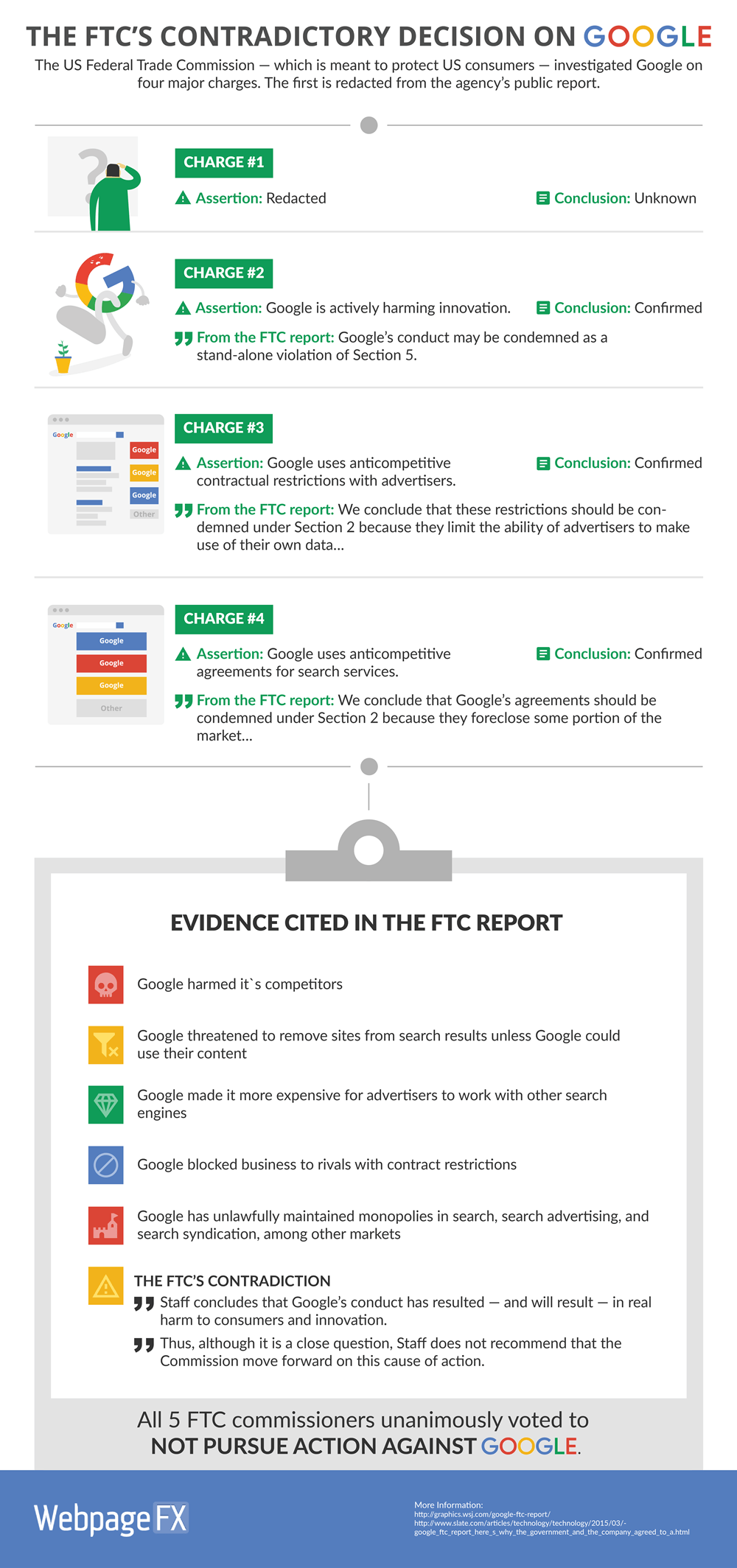 … nothing? To be clear, it actually wasn’t just “nothing” — it was a unanimous “nothing.” All five commissioners of the FTC that were tasked with investigating Google actively decided not to pursue action against Google, even though they had a laundry list of wrongdoings that borders on megalomaniacal.
… nothing? To be clear, it actually wasn’t just “nothing” — it was a unanimous “nothing.” All five commissioners of the FTC that were tasked with investigating Google actively decided not to pursue action against Google, even though they had a laundry list of wrongdoings that borders on megalomaniacal.
To add a layer of mystery to the investigation, the released FTC report — which you can find on the Wall Street Journal’s website — redacts the first charge against Google. (A text-only transcript is available here: https://assets.documentcloud.org/documents/1693236/ftc-ocr-watermark.txt.) It also references investigations performed by foreign institutions like the European Union to back up the possibility that Google is actively harming the search market specifically and the Internet market generally. Even with their evidence and foreign precedence, the FTC still decided not to pursue action against Google.
The agency’s contradiction can best be summed up in two lines from its report:
“Staff concludes that Google’s conduct has resulted — and will result — in real harm to consumers and to innovation…”
“Thus, although it is a close question, Staff does not recommend that the Commission move forward on this cause of action.”
If this seems confusing, well, it is. Keep in mind, this investigation is from 2012 — completely separate from the FTC’s investigation into Google’s potential unlawful use of Android. And nobody’s ever stopped Google from shady business tactics like financially supporting LendUp (which loans at about ~400% APR) and restricting ads from payday lenders, essentially cutting off traffic to their competition while building their own interests via investment.
With public influence, product integration, and legal precedence on Google’s side, they’re currently in a unique — and troubling — position, both economically and politically.
The problems with Google’s position
So far, we’ve established that Google has the means, motivation, and history to impact public opinion via search results — even if they’ve only used it to shut down competition in different verticals. But with Epstein & Robertson’s research, the implications of Google’s power go so much further than economics. 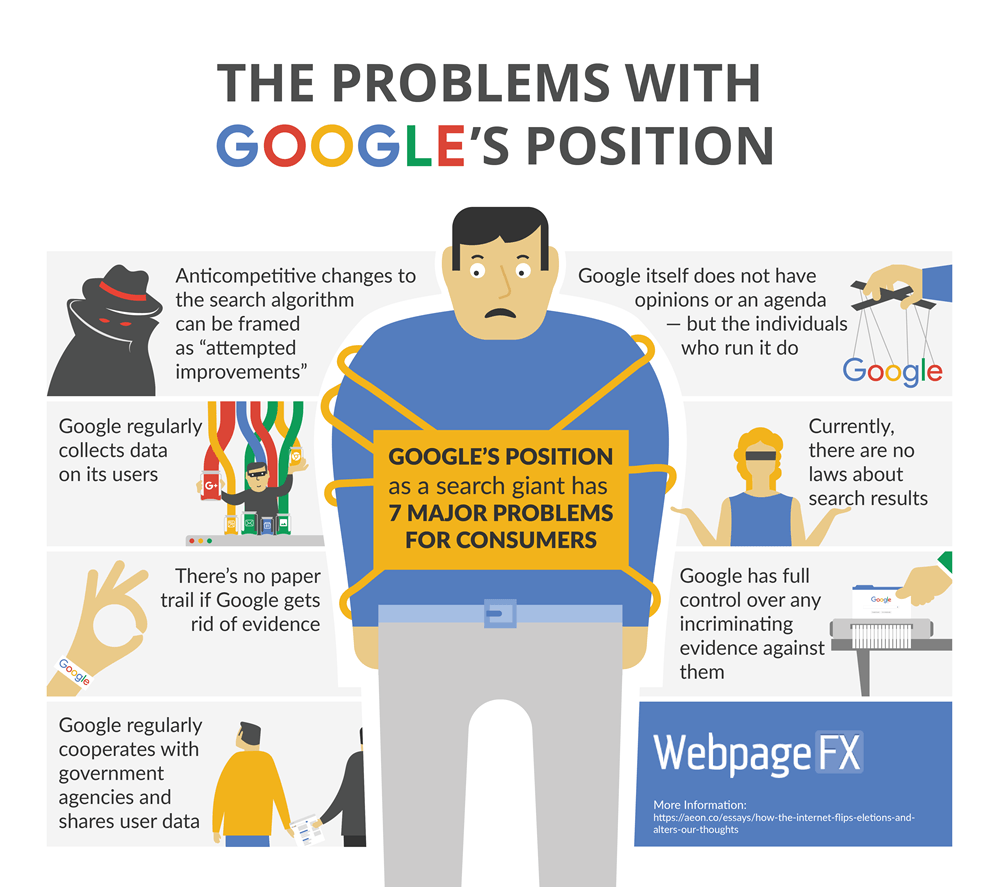 Ultimately, Google can empower select individuals to positions of national leadership and influence government policy on a worldwide scale.
Ultimately, Google can empower select individuals to positions of national leadership and influence government policy on a worldwide scale.
But, again, this is a big accusation. To back it up, we’d better have some hard-and-fast proof that Google has manipulated elections in the past, right? You’re right.
But we don’t. Interestingly, while the potential for manipulation is present, there haven’t been any recorded cases of Google actively changing search results to influence any elections. On the one hand, that renders this entire article as just one big conspiracy theory.
On the other hand, how could someone prove that Google intentionally manipulated search results? Remember, Google makes about two changes to its search algorithm per day. So even if someone there did intentionally change a set of search results, they could easily deflect the accusation by saying it was the unexpected result of an algorithm update.
There also aren’t any laws about search engine results — at least not yet. That’s partly because search engines are still so new to the world that legislation hasn’t caught up yet. It’s also because Google’s search algorithm is by far the most advanced in the world.
This is a company that’s on the cutting edge of what was once science fiction like driverless cars and machine learning. The minds at Google are so far ahead of their time, it would take a perfect storm of circumstances to find evidence of Google’s wrongdoing in an election. And keep in mind that Google’s algorithm is protected as a trade secret, like the formula to Coca-Cola.
That means no one can make Google tell them how their algorithm works — some of the world’s most powerful governments want to help Google keep that algorithm a secret. So what’s the verdict? Google’s in the clear.
When you control the means of information dissemination and the methods by which that information is retrieved, you can do anything. The only “evidence” that Google has done something wrong is purely circumstantial and comes uncomfortably close to actual conspiracy theories. So what’s the point of all this then?
What’s the point of this article?
Awareness.
Google permeates daily life for anyone who uses the Internet or a mobile device. They have some of the most popular and powerful digital products in the world, including a blazing fast and affordable Internet service. That means at some point in your life — even if you’re one of the few people who use the Internet and don’t use Google — you’ve given some kind of data to a company you don’t fully know or understand.
In this age of easy access to virtually any information someone could want, it’s critical that you keep an eye on the personal information you hand off to other companies. This is especially important today since Google frequently cooperates with governments and individual agencies, including those in the US. According to The Guardian, the NSA already has all of the data on you that it could need from Google, Apple, and a variety of other top-notch Internet companies.
So when your personal information goes to Google, it doesn’t stay in Google’s cache. It also goes to the NSA, among other cloak-and-dagger agencies. And now that you know about this, you also need to act on it.
What can you do?
Even though Google controls a lot of information, you have some means of privacy.
- Set your privacy settings: https://myaccount.google.com/privacy
- See your history: https://history.google.com/history/
- See your use of Google products: https://www.google.com/settings/dashboard
- Use alternatives to Google Shopping, Travel, and other services
- Use alternative search engines
- Use VPNs to access the Internet
You can look up more privacy strategies to protect your information as well. But maybe use DuckDuckGo to do it.
Epstein’s warning
To finish, Dr. Epstein concludes his essay on Aeon with a simple idea that is almost harrowing.
Referencing Vance Packard’s The Hidden Persuaders, Epstein illustrates why all of us — individuals, small businesses, and Google’s competitors — need to remain aware of Google’s role in our lives.
“The new hidden persuaders are bigger, bolder, and badder than anything Vance Packard ever envisioned. If we choose to ignore this, we do so at our own peril.”
What are your thoughts?
Did you know how much data Google has on you? Have you heard of their legal run-ins before?
What do you think about their potential power to change the political landscape of whole countries? We want to hear from you! Tell us your thoughts on Twitter or Facebook today!
Sources and additional reading:
- https://aeon.co/essays/how-the-internet-flips-elections-and-alters-our-thoughts
- https://what-if.xkcd.com/63/
- http://www.bloomberg.com/news/articles/2015-04-14/google-faces-fines-search-constraints-as-eu-decision-approaches
- http://digitalcommons.law.umaryland.edu/cgi/viewcontent.cgi?article=2530&context=fac_pubs
- https://www.google.com/about/datacenters/inside/locations/index.html
- http://www.latimes.com/world/asia/la-fg-china-credit-system-20151122-story.html
- https://moz.com/blog/the-evil-side-of-google-exploring-googles-user-data-collection
- https://www.netmarketshare.com/search-engine-market-share.aspx?qprid=4&qpcustomd=0
- http://www.nytimes.com/2014/02/06/technology/google-reaches-tentative-antitrust-settlement-with-european-union.html
- http://www.pewinternet.org/2012/03/09/search-engine-use-2012/
- http://www.pnas.org/content/early/2015/08/03/1419828112.abstract?sid=2096de02-a382-4aeb-89e0-df794a4ca03a
- http://www.politico.com/magazine/story/2015/08/how-google-could-rig-the-2016-election-121548
- http://qz.com/520652/groundwork-eric-schmidt-startup-working-for-hillary-clinton-campaign/
- https://www.sec.gov/Archives/edgar/data/1011006/000119312515348230/d48361d8k.htm
- http://www.slate.com/articles/technology/future_tense/2015/12/why_google_search_results_favor_democrats.html
- http://www.slate.com/articles/technology/technology/2015/03/google_ftc_report_here_s_why_the_government_and_the_company_agreed_to_a.html
- http://www.wired.com/2012/10/ff-inside-google-data-center/
- http://www.wsj.com/articles/how-google-skewed-search-results-1426793553
- http://www.wsj.com/articles/inside-the-u-s-antitrust-probe-of-google-1426793274
- http://graphics.wsj.com/google-ftc-report/
-
 Trevin serves as the VP of Marketing at WebFX. He has worked on over 450 marketing campaigns and has been building websites for over 25 years. His work has been featured by Search Engine Land, USA Today, Fast Company and Inc.
Trevin serves as the VP of Marketing at WebFX. He has worked on over 450 marketing campaigns and has been building websites for over 25 years. His work has been featured by Search Engine Land, USA Today, Fast Company and Inc. -

WebFX is a full-service marketing agency with 1,100+ client reviews and a 4.9-star rating on Clutch! Find out how our expert team and revenue-accelerating tech can drive results for you! Learn more
Try our free SEO Checker
Boost your site’s search performance with our free SEO Checker. Analyze your website for optimization tips on titles, headers, content, speed, and more. Get a free report now to enhance rankings on Google, Bing, Yahoo, and beyond!
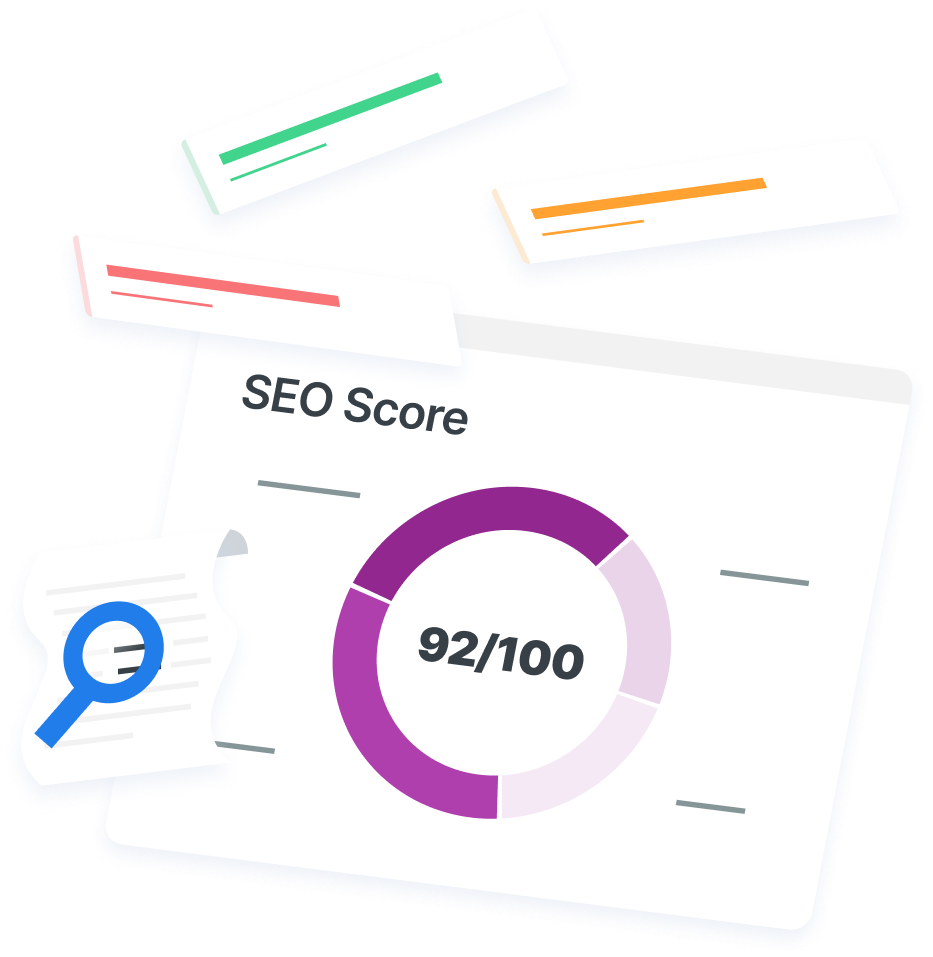
Table of Contents
- Dr. Robert Epstein & Ronald E. Robertson: the Google Experiments
- Google’s Search Market Share
- Google’s History of Search Manipulation
- Google’s Massive Data Cache
- The FTC’s Decision on Google
- The Problems with Google’s Position
- What’s the Point of This Article?
- What Can You Do?
- Epstein’s Warning
- What Are Your Thoughts?
- Sources and Additional Reading:

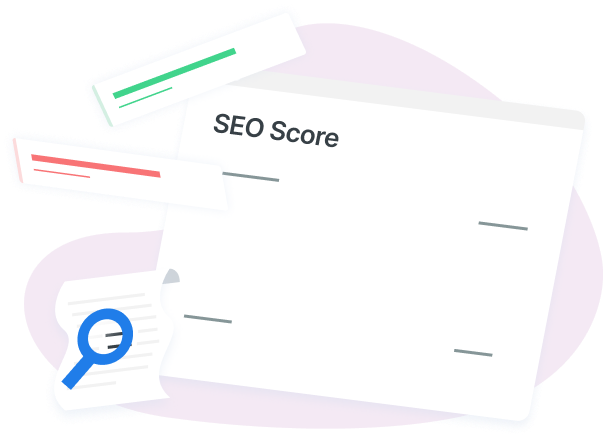
How Is Your Website’s SEO?
Use our free tool to get your score calculated in under 60 seconds.
Try our free SEO Checker
Boost your site’s search performance with our free SEO Checker. Analyze your website for optimization tips on titles, headers, content, speed, and more. Get a free report now to enhance rankings on Google, Bing, Yahoo, and beyond!






